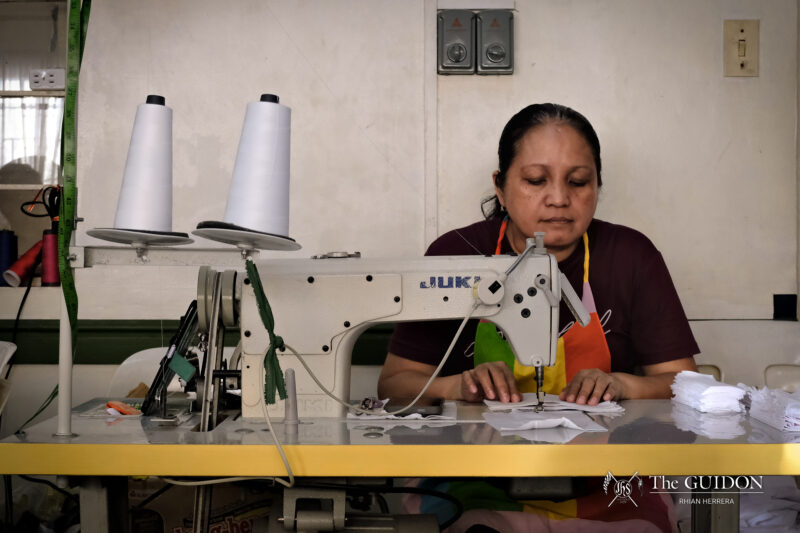The first verse describes a classic girl-meets-boy scene. The Filipina singer, smitten at the sight of the debonair, pale-skinned chinito, is suddenly rendered speechless. She soon averts her gaze, as she realizes that she had stared for too long—but not before promising that one day, she will gather the will to let him know what she truly feels.
In the ensuing verse, Yeng Constantino throws a longing look at Enchong Dee, the dance-savvy Filipino-Chinese (Fil-Chi) bachelor. She sums up her fantasy: “Dahil nabihag mo ang aking paningin at damdamin / Oh Chinito!”
(For you have captivated my eyes and feelings / Oh Chinito!)
The proverbial Great Wall between Filipino and Fil-Chi partners has acquired an enduring mystique in local pop culture, having been immortalized in television and in the 2013 hit single, Chinito. But beyond depictions of love at first sight, what does it really take to scale the Wall?
Reaching for the stars
For Loyola Schools senior Bituin*, crossing cultures entailed dealing with disapproval and cold shoulders. “[My former partner’s] parents didn’t accept me talaga,” she says. “Kasi nga, I’m not any part Chinese.”
The impediments of the Wall, Bituin says, had been acknowledged at the outset of her relationship to Jian*, her former Fil-Chi partner. She likens the phenomenon to a “cultural barrier” that she found daunting to cross. “I think when we just started dating, [the Wall] was brought up.”
For Bituin, crossing this barrier required finesse and cultural sensitivity. To prevent a faux pas at a family event, the young lady recounts having memorized the proper Chinese names to address Jian’s relatives with, which differed depending on which side of the family they hail from.
Bituin asks, “If you don’t show an effort to learn about their culture, then how will they accept you as a future family member?”
Still, Bituin was not the only one to make adjustments. Early on in their relationship, Jian had asked Bituin’s parents for permission to take their daughter out on a date. “He went out of his way, wore something nice, and went to our house. Then he talked to my parents [about dating me],” she shares. “Because that’s the Filipino way to do it, right?”
The Loyola Schools student mentions how her Filipino parents, whom she described as “liberal,” were very open to her dating Jian. Since Bituin was not allowed at her ex-boyfriend’s home, she says, it was Jian who visited hers during their time as a couple.
The Wall deconstructed
As with any relationship, differences in lifestyle may inevitably lead to conflict. Cheryl L. Crippen, PhD, an expert in cross-cultural counseling, points out in her research that people from two distinct cultural groups must overcome more adjustments to preserve their relationship.
To those new to the concept, this dating barrier can be seen as mystifying or overwhelming. Others argue that the Wall is simply a racist notion by the Chinese.
Alyda Keh, a counseling psychologist at the Ateneo Bulatao Center for Psychological Services, shares her thoughts on the matter, saying, “I certainly won’t say that it’s generally being racist [to] Filipinos, but it could be.”
However, she stresses that it differs based on the families’ perspectives. Drawing from the experiences of clients she met, she suggests that wealth could be a greater reason. “The race is not that important compared to socioeconomic status and that ability to be hardworking,” Keh elaborates.
Still, riches could only get you so far in climbing over the Wall. The deeper rationale behind it can be explained by taking a glimpse into the typical Chinese family’s dynamics and principles. “Chinese communities seem to have a very strong in-group culture [that] they want to maintain,” Keh says.
In social psychology, the in-group is a social grouping among individuals who share the same qualities. Chinese culture is considered collectivist—prioritizing loyalty and interdependence within the family. This could explain how traditions and values are kept through their tightly-knit community.
Untainted heritage
Hilariously referenced in an episode of Fresh Off the Boat, an American sitcom about the life of an Asian-American family, a tradition that usually causes tension in relationships is the zuo yue zi (sitting the month). After giving birth, the mother must rest indoors for 30 days while avoiding physical labor as a female relative (from the mother’s side) assists her.
A 2004 study published in Sociological Focus revealed, in an interview with 12 couples, that most of the Euro-American men disapprove of zuo yue zi for their Chinese partners, saying that it is meaningless and it reduces privacy in the home.
The rest of the family is also involved in other traditional gatherings like Chinese New Year celebrations, ting hun (an engagement ceremony), and countless funeral practices. Family members must participate in complex rituals—most of which a foreigner might not comprehend.
Vito*, an Atenean freshman dating a girl with a Wall, believes that the Wall is put up to preserve traditions. “It would be more convenient and easier if the partner of your [child] shares the same values as you.”
The word “values” also gets thrown around quite often when talking about Chinese practices. This usually refers to ancient Confucian values (e.g. humaneness, filial piety), which the Chinese traditionally adhere to. One could say that the Chinese are more extreme in following these values than the Filipinos.
Filial piety stands at the cornerstone of these values. Respect for parents is valuable and essential—even in selecting partners. This could be why the Chinese have no choice but to follow their parents if they don’t already impose the Great Wall on themselves.
Climbing the Wall
Still, the proverbial Great Wall is not impenetrable. Keh recounts the story of a Filipino who, despite initially having difficulties mingling with his partner’s family, successfully scaled the wall after his partner’s kin got to know him.
“[T]he parents of the girl saw [the Filipino] as hardworking and he was also very polite and respectful […] and eventually, the parents agreed for them to get married,” Keh shares.
On the other hand, Vito has yet to completely scale the wall, “The mom knows that I’m making ligaw (courting her) but, she doesn’t know that we’re a thing.”
Despite the cultural differences and parental involvement that Vito and his partner face, he explains that their relationship has lasted due to their open-mindedness. “Everyone is raised differently. If you’re willing to go over the traditions and culture, then I’m pretty sure it’s smooth sailing.”
Although not having familial approval may lead to anger and chaos in the clan, she explains that what matters most is how one deals with the negative response. She also explains that one must discern what he or she really values to be able to realize what one desires.
Vito also emphasizes that importance of discerning one’s values, “It really depends on the person on what she values. […] There are aspects of [someone] that you really can’t change and sometimes those aspects can affect the relationship.”
There are times when the distance that separates two cultures is so great that the relationship crumbles. And so, despite being penetrable, the Great Wall endures for a reason. It’s garnered its infamous reputation by keeping out the faint of heart and allowing only the most committed to make it to the other side.
*Editor’s Note: Interviewees have requested anonymity in sharing accounts of their relationships.







